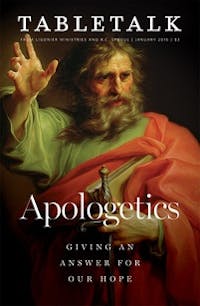
Request your free, three-month trial to Tabletalk magazine. You’ll receive the print issue monthly and gain immediate digital access to decades of archives. This trial is risk-free. No credit card required.
Try Tabletalk NowAlready receive Tabletalk magazine every month?
Verify your email address to gain unlimited access.
When people first hear the word apologetics, they typically think of our modern use of the word apology. They often conclude that the task of apologetics is apologizing for the Christian faith as if to say we are sorry for our faith. However, the word apologetics derives from the Greek word apologia, which means “to give an answer” or “to make a defense.” Apologetics is not an apology, it’s an answer—a defense of what we believe. In his first epistle, Peter writes, “In your hearts honor Christ the Lord as holy, always being prepared to make a defense to anyone who asks you for a reason for the hope that is in you; yet do it with gentleness and respect” (1 Peter 3:15). In his commentary on 1 Peter, Dr. R.C. Sproul writes:
Our preparation is to make us ready to give a defense and a reason for the hope that is in us. . . . If your neighbor says, “I notice that you are a Christian. What is it that you believe?” are you ready to explain not only what you believe but why you believe it? Some Christians tell those who inquire that we simply take a leap of faith with no bother about the credibility or the rational character of the truth claims of the Bible, but that response goes against the teaching of this text. The only leap of faith we are to take is out of the darkness and into the light. When we become Christians, we do not leave our mind in the parking lot. We are called to think according to the Word of God, to seek the mind of Christ and an understanding of the things set forth in sacred Scripture.
God calls us to be ready to make a defense for the hope that is in us, but notice that He calls us to do it with gentleness and respect. Apologetics isn’t just for some Christians, it is for all Christians. We all must know what we believe, why we believe it, how to live it, how to defend it, and how to proclaim it—and we must do so with gentleness and respect.
